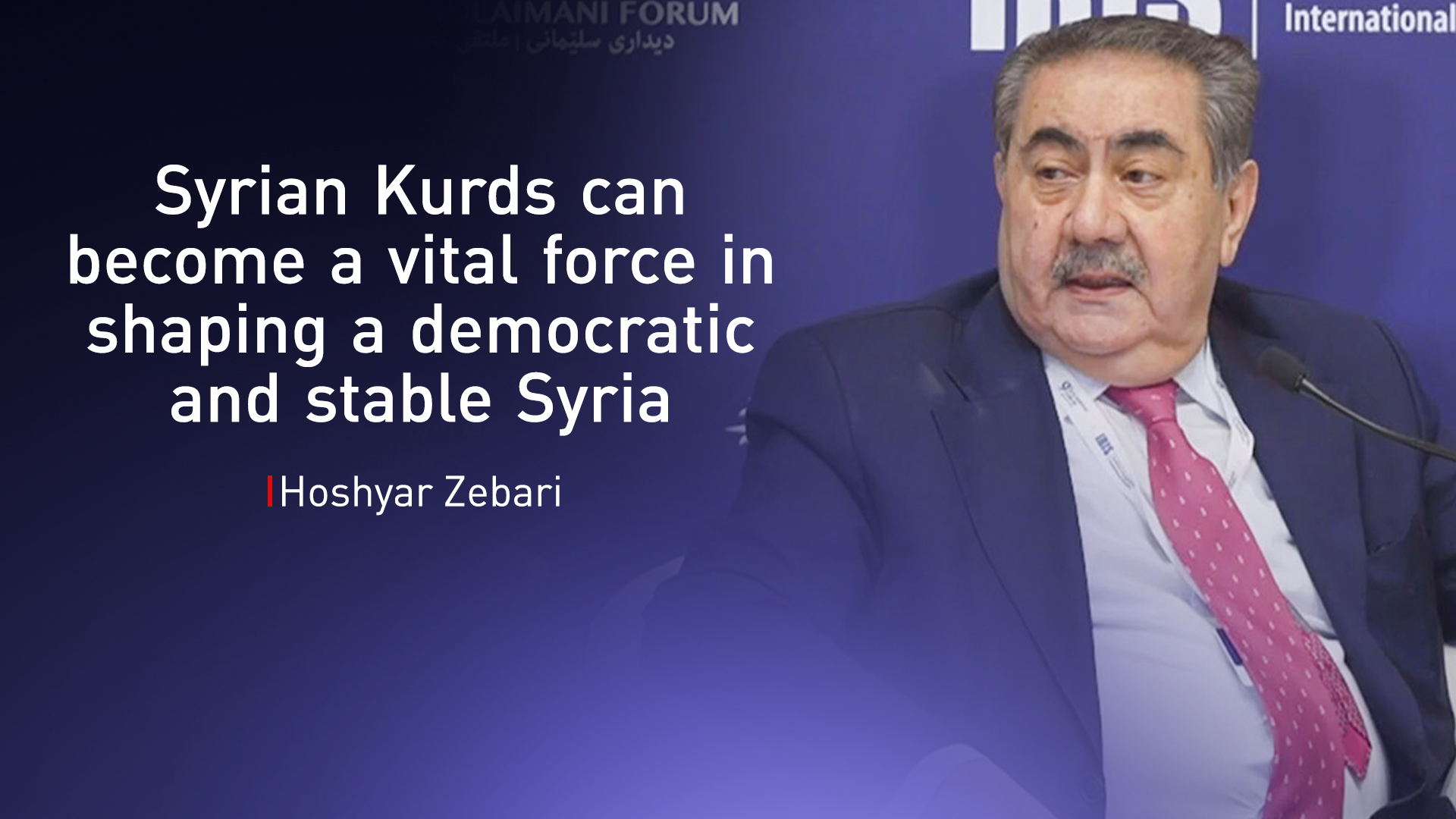Hoshyar Zebari to Kurdistan24: Syrian Kurds Can Benefit from Our Experience
Hoshyar Zebari said that Kurdish demands must be “realistic and legitimate,” adding, “Expectations must be grounded in local context—not imported wholesale from elsewhere.”

By Ahora Qadi
ERBIL (Kurdistan 24) – Hoshyar Zebari, a leading member of the Kurdistan Democratic Party's (KDP) politburo and former Iraqi foreign minister, stated that Syrian Kurds stand at a critical crossroads—and can greatly benefit from the historical experiences of the Kurdistan Region in navigating post-conflict transitions.
Speaking at the ninth Sulaymaniyah Forum 2025, Zebari joined a high-profile panel alongside Ilham Ahmed, foreign relations head of the Democratic Autonomous Administration of North and East Syria (DAANES), and veteran U.S. diplomat Peter Galbraith. The session focused on Syria’s evolving political landscape and the future of Rojava.
“This Is Just the Beginning for Syria”
Zebari reiterated that recent developments in Syria mark only the beginning of a longer process. Referring to the March 10 agreement signed between Mazloum Abdi, commander-in-chief of the Syrian Democratic Forces (SDF), and Ahmad al-Shara, head of Syria's transitional phase, Zebari described the accord as a "pivotal moment."
“This agreement, backed by us, our partners, and our Western allies—particularly the U.S. and France—is a significant first step to ensure that Syrian Kurds have a role in the future political framework of Syria,” he told Kurdistan24.
Zebari emphasized that the political shockwave triggered by the Assad regime’s collapse on Jan. 8, 2025, reshaped not only Syria but the region at large. “No neighboring country remains untouched by this dramatic shift,” he said.
The Need for Realism and Unity
Reflecting on Kurdistan’s own post-regime experience in Iraq, Zebari warned against overidealizing any one model. “We do not suggest a copy-paste model,” he said. “However, based on our experience within the federal framework of Iraq, we can extend sincere support to our brothers in Rojava—particularly in building a cohesive and unified Kurdish political front.”
He underlined that Kurdistan of Syria possesses capable institutions and leadership, but success will depend on unity among Kurdish forces. “Just as we, post-2003, marched to Baghdad as one team, so too must the Kurds of Syria present a united voice,” Zebari said.
At the same time, he cautioned that Kurdish demands must be “realistic and legitimate,” adding, “Expectations must be grounded in local context—not imported wholesale from elsewhere.”
Ilham Ahmed: The Agreement Marks a Historic Turning Point
Ilham Ahmed, representing the DAANES, described the agreement between Abdi and al-Sharaa as “a defining moment” for Kurds and all ethnic groups in Syria. “For years, we were labeled as separatists merely for advocating autonomy. This agreement puts an end to that mischaracterization,” she said.
Ahmed said the implementation phase is now underway, with working committees set up to address key technicalities. “Our discussions have already led to significant convergence on sensitive issues, including the contested neighborhoods of Sheikh Maqsoud, Ashrafiyeh, and the Tishrin Dam area,” she added.
Path Forward for Syria's Reconstruction
Ahmed expressed hope for broader political dialogue in the coming months and reaffirmed her administration’s commitment to the reconstruction process. “We see ourselves as serious partners in rebuilding Syria—politically, economically, and socially,” she said.
When asked about the applicability of the Kurdistan Region's experience, Ahmed responded: “We respect what the Kurdistan Region has achieved. Yet, Syria’s social and political fabric differs significantly from Iraq’s. We must learn selectively—what suits our context.”
A New Syria in the Making
Both Zebari and Ahmed acknowledged that Syria's new power structure is still in its infancy. “Fifty years of authoritarianism cannot be erased overnight,” Zebari said. “The new authorities must expand their political engagement and embrace pluralism to redefine Syria’s national identity.”
As the region eyes the post-Assad era with cautious optimism, Kurdish leaders from Iraq and Syria are calling for pragmatism, coordination, and a long-term vision grounded in mutual respect and inclusive governance.
"The road ahead is not easy," Zebari concluded, "but with unity and strategic planning, Syrian Kurds can become a vital force in shaping a democratic and stable Syria."
